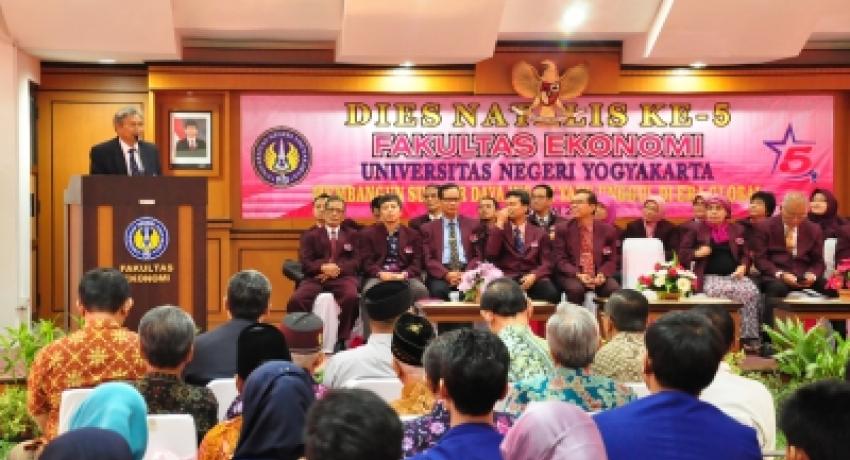SMEs have become one of the important aspects in the economy in Indonesia. Central Statistics Agency (BPS) in 2009 shows that SMEs account for 56.92% of the total Gross Domestic Product (GDP) of Indonesia, or equivalent to Rp 1213.25 trillion. SMEs, in Indonesia, generally do not have the financial information that is transparent and well organized, making the credit providers face difficulties in obtaining information on their financial condition and business. With the opening of the ASEAN Economic Community, SMEs in Southeast Asia in general and Indonesia, in particular, face a certain challenge.
As explained by Prof. Dr. Nahiyah Jaidi Farraz in his scientific oration entitled "ASEAN Economic Community: Opportunity or Threat for SMEs?" at the 5th Anniversary of the Faculty of Economics (FE) YSU at the FE Auditorium, Wednesday (22/6). This first five-year anniversary was attended by more than 150 attendees consisting of faculty, staff, student representatives, as well as invited guests consisting of post-retirement staffs and partner schools. In addition, the Senate, the Rector and its staff and the deans of all faculties also attended the ceremony. This event became the highlight from various events in welcoming the anniversary of FE YSU which takes place every June 22.
Nahiyah, who is also a professor at YSU in the field of Human Resource Management is continuing, that FE YSU has contributed in helping SMEs flourish in the era of AEC. In addition to the funding of research and community service, the FE lecturers also participated directly through the Institute for Research and Community Service (LPPM) YSU through the Center for the Study of Entrepreneurship Development and Assistance for SMEs. The events of Products Research Display, PPM, and Innovation are routinely held in YSU to facilitate SMEs around Yogyakarta
However, he added, efforts that have been done so far should be improved both in quality and quantity. There are five strategic points that could serve as guidelines. First, the increase in productivity, use of technology and innovation. Second, increase access to finance. Thirdly, increasing market access and the process of entering the international market. Fourth, the improvement of policy making and regulation that is more conducive. Fifth, entrepreneurship development and capacity building (Ministry of Cooperatives and Small and Medium Enterprises, 2016).
In his speech, the Rector of YSU Prof. Dr. Rochmat Wahab explained that AEC is one part of globalization. There are many concerns that ultimately led to counter-movements. "We should not get stuck just on economic issues. Far more important, are the values of humanities and other aspects related to human being. Various universities are now beginning to teach students about the cultures of other countries, so that they regard other nations as a whole human being, not just economic beings, "he explained. (fadhli)





